World Kidney Day: How to make kidney health accessible across social barriers
This day serves as a platform to highlight the significance of kidney health and to advocate for equitable access to kidney care
By Anoushka Caroline Williams
Hyderabad: World Kidney Day on March 14 is a global initiative aimed at raising awareness about kidney health and the importance of early detection and prevention of kidney diseases.
This annual event serves as a platform to highlight the significance of kidney health and to advocate for equitable access to kidney care for individuals worldwide.
Against this backdrop, NewsMeter delved into a dialogue with Dr Sashidhar, a senior consultant nephrologist based in Hyderabad who worked with Mahavir Hospitals and TX Hospitals. He provided insights into the challenges, strategies, and innovations in kidney care.
Here are excerpts from the interview.
1. How can healthcare providers advance equitable access to kidney care for all?
A. Healthcare providers can spread information about educational programmes on chronic kidney diseases. They can conduct awareness programmes, import training to primary care physicians, and community and health workers and screen public programmes on preventing chronic kidney diseases.
2. What are the key barriers to optimal medication practices in kidney health and how can they be addressed globally?
A. I believe that rising costs and lack of knowledge about various drugs and modalities in treatment are barriers to healthcare when it comes to kidney health. Doctors and governments all over must address these issues.
3. Can you elaborate on the importance of early detection in ensuring kidney health, particularly in marginalised communities?
A. Tests such as a complete urine examination, B-urea and serum creatinine and creatinine ratio and kidney ultrasound imaging can help in early detection. Timely testing can reveal kidney diseases due to early screening and decrease the burden of kidney diseases on society.
4. What role do social determinants of health play in kidney disease and how can healthcare systems address these factors to improve outcomes?
A. Lower socio-economic status and poor quality education increase the prevalence of kidney diseases. Families from low-income strata should be informed about the importance of proper diet, combined with avoiding bad habits such as smoking.
5. How can advancements in telemedicine be leveraged to enhance kidney care accessibility on a global scale?
A. Telemedicine, which gained popularity during the Covid-19 times, has become vital for the health sector. Many apps have been launched by which patients have easy access to their doctors and healthcare.
6. From your perspective, what strategies or programs have proven effective in reducing health disparities in kidney disease outcomes?
A. Long-term treatment health strategies include reducing costs for primary prevention methods and stopping the spread of health misinformation and fake therapies.
7. What are the challenges/successes in promoting kidney health in low-income countries, and what lessons can be learned for a more inclusive approach?
A. In low-income countries limited resources can narrow down healthcare for all. It is better for everyone if health NGOs can come forward and educate people on kidney-related issues
8. How can the medical community collaborate with policymakers to create and implement initiatives that promote kidney health equity?
A. Healthcare delivery can be improvised by better patient and provider education. Patient-centred programmes have to be initiated. Better allocation of resources for healthcare and quality services should be initiated.
9. What educational efforts are crucial for healthcare professionals and the public to raise awareness about kidney health disparities?
A. Continued medical education programmes for doctors can keep doctors updated about the latest health information. Social media and newspapers also play an important role in educating the public.
10. How can research and innovation contribute to improving outcomes and narrowing the gaps in kidney care access and medication practices worldwide?
A. Research and innovation contribute to improving outcomes in various ways. We now use artificial intelligence for the early detection of kidney diseases.